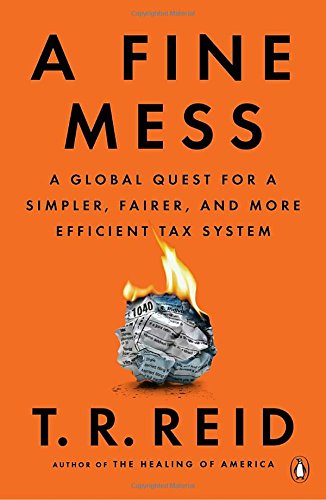Faced with limited choices in a high desert bookshop, I found myself reading about the US tax code. (Stay with me…). Turns out the IRS does not have a stellar reputation for simplicity and ease-of-use. Americans spend 6 billion hours a year filing their taxes, much of the time figuring out which forms are needed.
 Occasionally Congress determines to bring these evil bureaucrats to heel. But when challenged at committee hearings in 2016, I was amused at the IRS Commissioner’s repeated response:
Occasionally Congress determines to bring these evil bureaucrats to heel. But when challenged at committee hearings in 2016, I was amused at the IRS Commissioner’s repeated response:
“I didn’t pass the tax laws, Congressman, you did that.”
Congress passes an average of around 300 amendments to the tax code each year, almost all of them exceptions and one-offs. (One exemption was for companies incorporated in a given industry in a given state on a given date – short of naming the company, a literal one-off.) Each exception drives new tax assessment variations and new forms.
Sound familiar?
The complexity of group insurance admin environments is partly a reflection of the fact that, in the words of one industry veteran:
“We have made this the exceptions business.”
Consider that key moment late in the sales cycle. Sales says the employer has special administrative or product requests, perhaps because of an arrangement with the prior carrier, or some collective bargaining agreement.
Sales: “Can we do this?”
Admin: “Nope.”
Sales: “One more variation won’t make much difference. It already looks pretty complex back there.”
We know how this plays out. The commitment is made. More staff or more systems hacks are thrown at the problem. Not a high-quality conversation. Asymmetric power.
Political scientists say there is only one winner when a concentrated interest (the sales team’s commission; this quarter’s revenue figures) comes up against a more diffuse interest (subtle increase to admin complexity).

And while each concession may be individually minor, there is a ratchet effect. Complexity goes only in one direction, creating the familiar swamp.
While our business will never be one-size-fits-all, we are not factoring in the long-term costs of certain exceptions.
Sales don’t understand admin and will give it away for free.
When the new tech giants do come for our industry, they may or may not have better technology (not if you’re with FINEOS, etc.). But they will certainly regard the administrative complexity we have created and ask: “What have y’all been at here?” We already see Insurtechs like Lemonade making a virtue of simplicity, explicitly declaring war on exceptions (nice, they say, but just too costly).
Continued creation of “unthoughtful complexity” will erode or kill our relevance.
We need to have higher quality conversations.
Want to chat?


